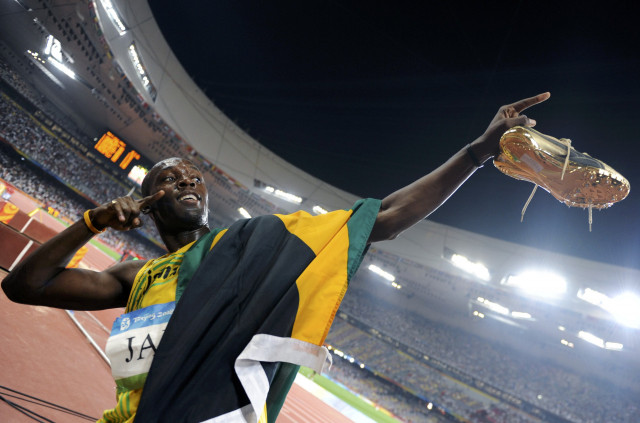World's fastest man Usain Bolt loses Olympic gold
IOC strip Jamaica of 2008 relay win after Nestor Carter tested positive for banned substance Methylhexanamine

PHOTO: REUTERS
The decision which follows the re-testing of hundreds of samples from the Beijing Games, means that Bolt loses one of the three gold medals he won at that Olympics.
Bolt's relay teammate Nestor Carter, who ran the first leg of the race, was found to have tested positive for banned substance Methylhexanamine, which was once used in nasal decongestants but now is more commonly found as an ingredient in dietary supplements.
‘I Am Bolt’ offers glimpse at Jamaican sprinter’s life
The loss of the relay gold deprives Bolt of one of his 'triple triples' -- he won gold in the 100m, 200 and the 4x100m at Beijing and then went on to repeat the feat in London in 2012 and again in Rio last year.
Last year, when he was warned of the doping case targeting Carter which could result in him losing an Olympic gold, Bolt said the circumstances were heartbreaking.
"It's heartbreaking because over the years you've worked hard to accumulate gold medals and work hard to be a champion -- but it's just one of those things," he said. "Things happen in life, so when it's confirmed or whatever, if I need to give back my gold medal I'd have to give it back, it's not a problem for me."
The IOC said in a statement that in the case of Carter, 31, re-analysis of his 2008 samples "resulted in a positive test for the prohibited substance methylhexaneamine."
Bolt from the blue as sprint star calls United TV
The IOC Disciplinary Commission ruled that Carter "is found to have committed an anti-doping rule violation pursuant to the IOC Anti-Doping Rules applicable to the Games of the XXIX Olympiad in Beijing in 2008."
As such, he "is disqualified from the men's 4x100m relay event" and must return his medal while the team is likewise disqualified and must hand back their medals.
Trinidad and Tobago, who came second, are promoted to gold medal winners, while Japan and Brazil move up to second and third place respectively.
The IOC said that Russia's Tatiana Lebedeva, who won silver in the women's triple jump event and long jump, had also been disqualified following re-analysis of her samples which showed up positive for dehydrochlormethyltestosterone (turinabol), a substance on the world body's banned list.
The IOC has been retesting samples from previous Games as part of its crusade against drug taking in sport as new technology facilitates bringing to book cases which were previously undetectable.
In the case of relay events, if one member of the team is found to have used illegal substances, the whole team is stripped of their medals, thus reducing Bolt's achievements to a 'mere' Beijing double to go with his triples in London and Rio.



















COMMENTS
Comments are moderated and generally will be posted if they are on-topic and not abusive.
For more information, please see our Comments FAQ